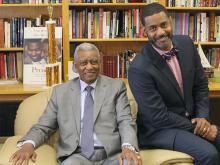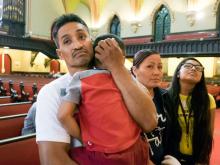Opinion

The idea of having power is so enticing that of all the theoretical options to destroy Christ, Satan chose the promise of ruling the world as his best and final temptation of Jesus in the desert. It was ultimately a futile attempt, but given the biblical narratives displaying humanity’s addictive desire for earthly kingdoms, their bloodlust for military victories, quests for political dominance, and insatiable greed for wealth, it’s unsurprising that it’s through these manifestations that Christianity is most vulnerable to ruin.

Most Christians I know who have a lot of negative feelings about feminism lack proximity to actual feminists. When I say proximity, I don’t mean that you follow a well-known feminist writer or celebrity on Twitter, or sat in on a think tank, or have that one family member who you only speak to over Thanksgiving dinner. What I mean is most of our circles tend to be homogeneous. We hang closely with people who look, think, and act like we do. We also tend to build close relationships with people who agree with us on certain issues. We further validate our efforts to remain in these homogeneous circles by oversimplifying scripture like, “iron sharpens iron”, or by stating our need for “safe spaces” and like-minded community. However, Jesus did the exact opposite. From life to the desert to the cross, Jesus lived his life and sacrificed it for people who did not look, think, or act like him.

In a nation founded on violence, how are we to respond when young indigenous people are beaten to death by police or young black men are shot in the front seat of their cars? What do we do when young Muslim women are assaulted on the way to say prayers with their community? In an attempt to protect ourselves from violence, we actually bring violence to our schools and neighborhoods, because we live a gospel of violence perpetuated over time by our attitudes of hate and racism toward one another.

The old model was that God created the earth, and human beings were given dominion over it. The earth was a “thing” separate and apart from God. A “thing” to be used by human beings. The new model, and one that makes profound sense to me, is that the earth is the embodiment of the divine presence. It’s not that incarnation happened once and only once in the body of Jesus, but in fact the entire landscape of planet earth is God making incarnate God’s self over and over again.

I had a dream last night that I was reunited with estranged family. Watching them live their lives and being separated from them became unbearable. I sat in my family member’s living room weeping, saying: “I can’t do this anymore.” My not-so-little-anymore niece took me by the hand, in my dream. She walked me to a corner in her room where she laid a prayer cloth on the ground, knelt on her knees facing east, and asked me to offer prayers of forgiveness with her. It stunned me. I woke up.
Forgiveness.

Father: The necessity of the black church, the African-American church, I think is continuing and compelling. We in my generation depended on the delivery of the Word from the individual but we did not take advantage of all of the technology that was becoming big. I think in this age we must utilize all of the technology plus imagination and all of the equipment that’s available to us to communicate, to involve and to be relevant and liberating both in our word and in our deed.

I believe that although we enjoy fairytales about love overcoming great obstacles, it’s often different off-screen. We are more interested in creating obstacles to love. In our world, Cinderella doesn’t get to dance with the prince and beauty isn’t allowed to love the beast.

The assumed exceptionalism and excessive triumphalism of the American church conflicts with the biblical call for humility as evidenced by lament. The practice of lament in the Bible confronts our American Christian assumptions. Biblical lament calls for honesty and truth-telling about the broken state of society and the individual. As such, the excessive triumphalism of American society has nearly quashed a necessary countercultural practice.

The theology, sociology, and politics of race continue to play themselves out in America in matters of both church and state. That racism is a sin and a gospel issue — and not just a political matter for us as Christians — was asserted once more yesterday. The continuing struggle to put our theology over our sociology among white Christians was again on display.

The core of the contemplative path is not just an individualistic process; it is about being a deeper part of the communal human family through the action of how we live out a just and radical spiritual truth, as Christianity was founded in the radical and revolutionary path of Jesus. The root of the Jesus story, of "becoming" his calling and path, is inherently about the integration of contemplation, action, and healing.

It’s hard enough for somebody who has a lifetime of experience navigating how to be a Christian in Iraq. But most of those facing deportation have no such experience. They don’t have a support network in Iraq. They don’t have homes or families to return to. They don’t even have IDs. Everything they know is in America.

Focus on healing in movement spaces is often reserved for times of crisis — or is reduced to individual consumerist self-care like a glass of wine and a pedicure. In our leadership development, community cultivation, and organizing models, focusing on resilient, integrated, whole selves is considered extra — a fun and indulgent add-on to the “real work of organizing.”

O God,
this morning when we woke to your presence in and around us,
we also woke to a heavy world,
and in this world, we can’t make sense of all the things
that are wrong and should be made right.

Though they gave respectable answers, I was amazed no one directly quoted the Christian Gospels on the subject.
The Gospel of Mark provides one saying of Jesus directly applicable to this situation. But when we examine subsequent uses of that saying in the other Gospels, we can see why none of the 60 Minutes interviewees dared quote that particular verse.

Trump’s trip, then, is the epitome of this unique, sales-based approach that characterized his campaign and administration — a move toward achieving personal, political, and even religious victory, simultaneously. But to what end? The only clear motivation to which I can point is the uncannily vague promise to “Make America Great Again.”

In essence, we have struggled to understand the work and responsibility of Christian compassion in issues of healthcare and policy. Should this responsibility be shared by all and secured by the government, or should it primarily be the domain of people of faith and those moved by a higher calling to mercy and healing? With the new GOP Health Care Bill, and the ongoing debates about healthcare in America, Christians across the aisle struggle to evaluate how well we are doing at caring for the disenfranchised and the sick.

In many conversations I’ve had with my friends who are people of color, it’s clear the church has set itself up in America to mostly benefit a certain kind of person. The white American church is a Western version of the gospel that often manifests as a top-down model that benefits the wealthy. And the more that I learn about my own Native American identity tied to the church, the more I see that truth throughout our nation’s history.

Our natural tendency after a horrific event is to rush too quickly into blame and explanation.
After the Pulse nightclub shooting here in Orlando, the worst mass shooting in U.S. history, which targeted the LGBTQ community and left 50 people dead including the shooter, I was probably not alone in asking, “Who did this and why?”

Film critic Alissa Wilkinson writes that “Christian theology is rich and ... full of imagination that's broad enough to take up residence among all kinds of human cultures. It contains within itself the idea that art exists as a good unto itself, not just a utilitarian vehicle for messages.” The Wedding Plan is a prime example of this kind of religious art. It’s a message movie, a window into a culture that makes the specific and personal universally relatable, and still manages to tell a good story.

The long history between the church and LGBTQ people is one fraught with tension, pain, and, sometimes, violence. Those who believe that homosexuality is a sin often point to several well-known Scripture passages from the Old and New Testaments. Most of the Christian debate about human sexuality has centered on interpretation and emphasis of these passages.
In his book God and the Gay Christian , Christian LGBTQ activist Matthew Vines challenges LGBTQ-condemning interpretations of these Scriptures — sometimes referred to as “clobber passages.” But these clobber-texts aren’t the only Scriptures that can guide faithful Christians as we seek a godly understanding of sexual and gender identity.